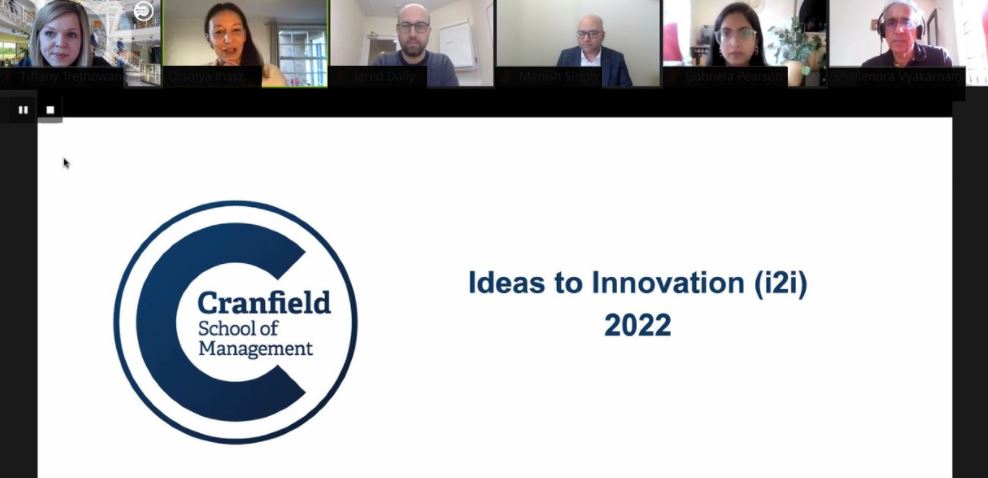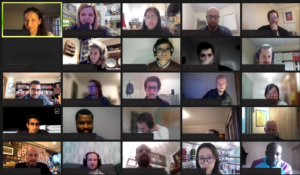Unlocking the entrepreneurial potential in research communities – What are you waiting for?
01/02/2022

Where am I going? What is the next step in my life? How can I grow and develop personally and professionally? How can I create meaning and purpose? Where can I find joy in my work? How can I bring positive change?
These are triggers we will all encounter at some point through our professional and personal journey in life. Asking these questions to ourselves gives us the opportunity to stop for a moment and reconnect with our own values and motivations and explore where we see ourselves creating the biggest impact.
I have spent the last 15 years in entrepreneurship development where I have encountered people from various backgrounds and disciplines, across multiple sectors, all with a similar desire to bring change to society and to contribute to the economy at a larger scale. I have also witnessed how entrepreneurship is increasingly becoming a social movement in most parts of the world. A movement that calls for structural changes in society causing a greater degree of individualization resulting in people having to flexibly restructure their resources and make their own work and life choices. These changes are causing us to rethink the way we see our own future, and the contribution we give make it worthwhile.
Ideas to Innovation (i2i) was born as ‘Enterprisers’ from a collaboration between Cambridge-MIT Institute in 2002 to explore how the entrepreneurial spirit and new innovative methods around entrepreneurship education can drive economic development. It has run over 44 times (40 face to face and 4 online) since its inception with the aim to develop self-confidence and an entrepreneurial mindset that enables researchers to apply their knowledge and skills to create new ventures or support existing ones through being proactive and innovative. Since then, circa 120,000 hours of entrepreneurship education were delivered, over 2000 researchers have now been inspired by the programme, across 75 Universities and circa 250 facilitators from the private and public sector engaged in the delivery and supported early venture creation nationally and internationally. i2i became the successor of Enterprisers in 2016 inspiring over 250 early career researchers across Cranfield to respond to the growing need for supporting technology commercialization across the campus and beyond and helped with the formation of entrepreneurial ventures such as Corrosion Radar.

To unlock the entrepreneur inside, nurturing an entrepreneurial mindset is key. The first step on this journey is to raise a sense of self–belief by reconnecting with personal values and motivations. Taking this first step of reflection could help to build self-confidence. Developing a set of knowledge and skills around how to start a business, will lead to the belief that ‘If you think you can do it, you’re more likely to try’ which also creates a positive attitude towards seeking opportunities and making things happen. These aspirational goals are potentially uniting forces where we could shift our mindset from being restricted to making new things happen and to enable outward looking positive communities to come together.
I2i is not only an educational experience but also a call for developing vibrant entrepreneurial communities that enable them to collectively create positive change in society. I believe that developing entrepreneurial mindset combined with an understanding of the process of entrepreneurship – in a context of making things happen – can be a force for change in so many ways. Lack of entrepreneurship and associated innovations means that we remain locked in an old system structure.
Building enterprising communities are the core for strengthening entrepreneurship as a social movement and the i2i journey has this capability. To support this, we have already built a partnership between UK universities and opened the programme to a wider network of researchers across Europe to enable cross-fertilization of ideas and create a multi-disciplinary environment. We believe that this will lead future collaborations and has built the bridge between academic research and the practical application of technologies leading to new entrepreneurial ventures to solve societal problems on a global level.
On a closing thought I would echo the original vision of this programme which was not necessarily a world full of entrepreneurs starting businesses or to give the impression that this is a career of last resort. But to instil a positive spirit into research communities and equip them with the skills to make inspiring links, they can apply in other career choices and consider making a difference as they grow and become powerful change agents.
For further details on the Bettany Centre please visit our website.
Categories & Tags:
Leave a comment on this post:
You might also like…
Keren Tuv: My Cranfield experience studying Renewable Energy
Hello, my name is Keren, I am from London, UK, and I am studying Renewable Energy MSc. My journey to discovering Cranfield University began when I first decided to return to academia to pursue ...
3D Metal Manufacturing in space: A look into the future
David Rico Sierra, Research Fellow in Additive Manufacturing, was recently involved in an exciting project to manufacture parts using 3D printers in space. Here he reflects on his time working with Airbus in Toulouse… ...
A Legacy of Courage: From India to Britain, Three Generations Find Their Home
My story begins with my grandfather, who plucked up the courage to travel aboard at the age of 22 and start a new life in the UK. I don’t think he would have thought that ...
Cranfield to JLR: mastering mechatronics for a dream career
My name is Jerin Tom, and in 2023 I graduated from Cranfield with an MSc in Automotive Mechatronics. Originally from India, I've always been fascinated by the world of automobiles. Why Cranfield and the ...
Bringing the vision of advanced air mobility closer to reality
Experts at Cranfield University led by Professor Antonios Tsourdos, Head of the Autonomous and Cyber-Physical Systems Centre, are part of the Air Mobility Ecosystem Consortium (AMEC), which aims to demonstrate the commercial and operational ...
Using grey literature in your research: A short guide
As you research and write your thesis, you might come across, or be looking for, ‘grey literature’. This is quite simply material that is either unpublished, or published but not in a commercial form. Types ...







